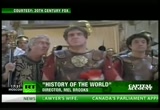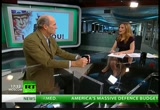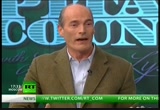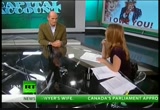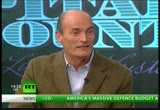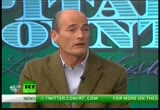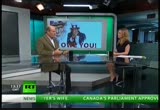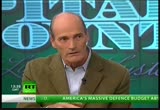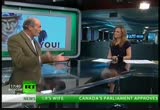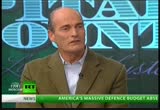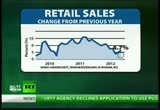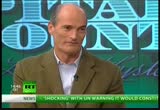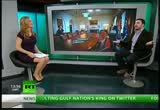tv [untitled] November 2, 2012 9:30am-10:00am EDT
9:30 am
to pay for a gallon of gas anything i don't. you see the signs from shortages of fuel to long lines for gas in new jersey to a black market in batteries flashlights and outlets in lower manhattan we'll talk about the case for price gouging let's get to today's capital account. watching presidential politics play out ahead of the elections next week there are speeches there have been debates there will be more speeches there are bigger lofty the presidential hopefuls tout plans they hope to be taken seriously but take a big step back and these candidates seem more like almost comedic actors in a play that will go on regardless of who occupies the white house come january
9:31 am
massive government spending muddy interest benefiting enormous debt accumulation borrowing pouring that money into a military empire propping up failed banks a politician on t.v. saying he can solve all of our problems all of the economy's problems it's just not only absurd it's agent. members now are if you remember oh oracle oh. oh shoot. it's important to remember as they sit in their ivory towers as debt accumulates and politicians isolated from the real problems they're purportedly trying to solve like unemployment day to day we have the news cycle of jobless claims consumer confidence payroll numbers with very little sense of how this all fits together and what it all really means so here to help us take stock is bill bonner e's
9:32 am
bestselling author of many books and founder of a gora so thank you so much for being here it's really nice we've been wanting to get you in this seat for a long time now pleasure being here oh well that's nice of you to say so let's talk about this because looking at the u.s. economy and people trying to figure out where it's going and if it's improving they look to different things they look to what politicians are saying on the campaign trail what plan they may have depending on who wins they look at economic indicators today we have jobless claims we have consumer confidence they look to the stock market do any of these indicators or is there any litmus test event that tells us where we are or where the economy is headed where the if you get the numbers some economists you're going to get some pretty fishy numbers and you don't want to pay any attention to them at all they mean something but they don't mean very much and they don't mean what they claim they mean you know those numbers of the unemployment for example or the inflation numbers or even the g.d.p. number the g.d.p. numbers are to be the biggest frog in economics you know it pretends to tell you
9:33 am
people think it says are you getting better or not is a g b g.d.p. growing or is it not but you know if i pay you to cut my lawn and you pay me to cut your lawn you know the g.d.p. will go up but is anything different anything at all we have trimmed lawns we have turmoil going to have had them anyway right and you know they if you build a bridge you build a bridge or i build a bridge you know imagine a bridge that i built you know i'm no engineer but i build a bridge the bridge i spend billions of dollars crossing the east. river the hudson river what happens the bridge falls down but the g.d.p. goes up right at that price isn't worth much if it's falling where it's worth nothing yeah what's really happened in those in those transactions especially the bridge transaction is that people have gotten poorer they've gotten poorer because they took resources and they used them for something that did not pan out you know it's not as simple the g.d.p. measures activity you cut by lot i cut your launch activity but what really counts
9:34 am
is not activity it's sensible investment it's using resources we only have so many hours in the day we only have so many neurons that can fire we only have so many thoughts we only have so much energy if we use it well we become wealthy or if we use a badly we become poorer and me building a bridge that's a pretty dumb way to spend use your resources doesn't work is there any gauge to show how the u.s. is doing on this or how any country is doing on this for that matter to me well i mean you should look at wages look at real wages the per the amount of money that a person earns per hour it tells you whether his effort is paying off real wages not just phony you know dollar that isn't made out of it how do you how do you look at real wages that way you have to you have to adjust them for inflation which is already pretty tricky because you can't trust these lean on driver employees that have been sitting there a bit but you have to go you could do it you have to be a tough work but you take somebody as hourly wages over time and ask yourself what will those wages by well and we do that evening even using the government's figures
9:35 am
today we find that wages have gone nowhere for forty years for forty years and i think about those forty years those were should have been the most productive the most wealth in hansing years in all of human history because we had never before in the history of the world have we had so many scientists so many engineers so many college graduates so many ph d's all working to try to make the world a richer better place and yet during those forty years the average working stiff didn't make a dime more why something was wrong. arlette watts well it's a long story about you know i don't know that whole story well but it involved in the short version that is i start first in this order his apartment first t.v. i wish i were a version is that you get wealthy by using your time and energy wisely and during those forty years in america and most of the developed world we started using our time and energy unwisely we started investing more and more in programs that really weren't going to make anybody any money and for example the u.s.
9:36 am
military budget i say military they call it a security budget when you take all that security spending over all that time and now you put all the security spending together it's about one point two trillion dollars per year that's a lot of resources that's a lot of energy going into something that will never ever be productive it will never create wealth what it does is it creates losses destruction that uses your resources and takes them and put them in something that is not really very valuable and we see that in washington going on this trajectory that's just continued regardless of who is in office in the white house democrat or republican so looking at this election that's coming up on tuesday will there be any material difference to this trajectory regardless of who is in the white house even if it was one of those third party candidates that we don't really hear much about but they're on the ballot but i like to say this is really a contest to see which group of zombies when you know on the one hand the obama administration is more committed to the democratic zombies you know all these programs disability support food stamps all those kinds of things and the mitt
9:37 am
romney machine more the more focused on the defense big spending wall street zombies and they're all zombies because they all take real resources flesh and blood out of the real economy and use them and don't produce anything and so but they cut the contest is really a contest to decide which group wins they won't make any difference really in the long run because the u.s. is running a huge deficit whether and where the money goes if as long as it's wasted it won't make any difference the deficit. the debt gets bigger and bigger the economy grows at a slower and slower pace and eventually blows up yeah ok well that brings me to you the debt and when this blows up because you wrote the empire of debt and maybe that's an indicator that shows where this country is headed it's staggering for both the government and the private sector what does the debt tell us about where we're heading when does this cataclysmic well i mean everybody nobody knows of these along that one of those things really big you can see you can look at the
9:38 am
debt look at japan japan's been heading to it's dead for ever it's been in this kind of slope on and off slope for decades and in a pair of cording to investors it's going to go on forever because they keep buying a japanese government bonds right well investors keep buying u.s. government bonds to indicating that they think this thing can go for a long time i don't know how long it will go but i know right now. unbelievably the actual debt is growing debt in proportion to the productive sector of the economy which is much smaller than the whole g.d.p. ok in proportion to the productive sector of economy the debt is growing at ten percent per year and it's already one hundred fifty percent of that productive sector of all the productive sectors that the people who have real jobs are real money who have to pay the debt ok and so when that explodes at this level it can't go on for too long how long i don't know maybe five years maybe ten but not forever
9:39 am
ok well five to ten years is not very long if you're if you're young you're hoping this thing could carry on for longer one thing that i do want to bring up because some argue the deficit spending is the way to help the economy and that spending is the way to get employment and i want to play you one of those gets you've been on our show says i don't know how many zeros you add the if you're at the federal reserve to that money supply doesn't matter let's take a listen. and not continue to focus on the monetary number because the number is irrelevant so you spend until it have full employment till fall and what i definition you're creating the greatest wealth your economy can create ok let me note that we. don't we want that bill bonner is that how you create wealth and full employment sounds pretty good to me whether if you could do it that way the people in zimbabwe would be the richest people on earth or the people in argentina or the people in via margarine money you know it doesn't work that way unfortunately you just can't get something for nothing if you want
9:40 am
something you've got to get it the old fashion way you've got to work for it you've got to say you've got to invest in capital producing capital of productive businesses you can't just print your money you can't just borrow money the whole thing is so crazy that whenever i hear somebody say that i just don't know where to begin to write. that apart it's just crazy you know this this stimulus thing is just a scam what it does is it by it takes money from you by steam assuming a central bank stimulus i mean and essentially buying it and fist fiscal and monetary either way it's the same thing you take money from the real productive economy and you give it to say banks now is and then the the idea is that the banks then will let it trickle down to the economy people get jobs but it's just just nonsense what you're really doing is you're a diverting resources from people who should use them the way they want from investors from businesspeople from households that want to save money for their retirement you're taking those resources you're giving them an iou thank you very
9:41 am
much government iou and then you take those resources and you give them to your favorite projects and who are the favored projects on of politicians well they're the people who make campaign contributions you know the people the big defense contractors those are wall street the wall street banks the banks have gotten something like one point seven trillion dollars in giveaways you know in grief and refunding it it's absolutely amazing i don't know why people stand for it i don't care i mean i think there's i don't know just bad just to get you don't understand with live life support so then how do you turn this around and get capital investment into things that are sustainable and get businesses really spending capital in the right way real quickly and then we'll go to break and talk more. about it well you just have to let nature take its course you have to let zombie institutions fail you've got to get the money away from those albums and in the into the hands of the real productive economy and the only way you can do that is just cut spending cut the bailouts cut the lower the interest rate. zero interest
9:42 am
rate policy you know all this kind of stuff you've got to let's cut out all you've got to let bad businesses fail so that new entrepreneurs can take over take the capital and reapply it sounds a lot like capitalism is not done so well i don't suppose to there you go let's go to break when we come back we'll talk about so much more with bill bonder in just a moment also still ahead after a long lines for gas now reportedly there are fuel shortages in the east coast region affected by superstorm sandy could price gouging help were discussed but first your closing market numbers. what will change when america picks this president i made muslim rage working the around times wrote pushing china and russia as occupy anger spreads to parties
9:43 am
still dictate their. selection of clothes guys every day to interfere on our team. do we speak your language i mean some of the. news programs and documentaries some spanish matters to you breaking news a little eternity of angles stories. for you here. the spanish find out more visit. on international rights on. we should not bomb iran we need to cut the budget and bring the troops all we should end the war in afghanistan tomorrow.
9:44 am
let's split the patriot act. the first. welcome back we're talking to bill bonde our founder of a gore i he's with us in studio and before the break we were talking about a financial recovery not a. fake economic recovery but a sustainable one so i want to ask you about this because people are talking about consumer spending they're excited the consumer confidence posted i think a four year high today we have
9:45 am
a chart like this i can show you of retail sales if we can bring it up it shows them improving after declining you know for for some time why is this something to get excited about that over leveraged indebted consumers are now more comfortable going out and buying a new computer is that the way we get to a recovery no of course not is and look at that little tick up on the chart and so that when you don't take it too seriously but is just the opposite of what we need you know the economy went into a slow because people had not saved enough money they had spent too much money that borrowed too much money that was obvious and everybody knew it and so when when you know when the crisis came the government came in and said and said in their typical dumb headed fashion that what we need is more consumer spending and so they try they lower interest rates to try to get people to spend money rather than a save it this is not a good thing our economy is that economy that needs savings savings is really what makes people wealthier over time not spending it which is again obvious to
9:46 am
everybody if you spend money you don't have it right you got to save it is really very simple folks and the simplicity of it is that when you want to really have a recovery you have to encourage people to save money rather than spend it and you've got to encourage them to take their money and apply it to businesses that can produce real value is no good just spending money right and left to buy things that you didn't need with money you didn't have read does not take you where you want to go right and yet this is the framework that we're still working with when you look at the mainstream media or you look at the politicians all of the reasons for the two thousand and eight crisis are they and this broken engine that we have are all the same things that people are looking to raise. start to get the economy going whether it's consumer spending or getting people buying homes again. so i guess the question for me is why why are people so hooked into this kind of pushing and pushing and pushing instead of just letting nature kind of take its course it's a failure of a philosophy really because what happened over the years in the twentieth century
9:47 am
was that economists began to think that they were scientist because scientists had much more ability to turn knobs and pull leavers and it was much more exciting to be somebody who could save the world than to be somebody who was sort of like a philosopher looking at it think that's kind of interesting and trying to make sense of it so these economists got the idea that they were a scientist and because they were scientists or engineers they could act like a scientist or an engineer and they could make things better you know they could improve the real economy but this was all nonsense you know economics is really a branch of philosophy it's like history or literature it's something where you you try to observe and then you tell the story of what happened it's a moral it's really a moral based system where you try to figure out what works and what doesn't work you know if you step on a rake and the handle comes up and hit you in the face or you don't pay your electrical bill you go for you go for a trip and you come back and you're like this city's turned out turned off it's not
9:48 am
a scientific problem it's not a it's not an engineering problem you've got to do what you've got to do and you've got to suffer when you make a mistake in the real world in the world of history literature and economics you've got to suffer the consequences you can't have a countercyclical monetary policy that will somehow make those those those bad things go away and debt is like that you know debt represents an obligation you've taken something you know two years ago you want to buy a hamburger you paid for with a credit card you took something from the future you took some of your life in the future because you didn't in some time in the future not to work in order to pay the debt the transaction is not completed in a. be completed until you pay for it right that's not something you can make go away with monetary policy or any kind of other you know sharp federal reserve formula so you blame economists for that exact we've gone on is that enabled by politicians so because they want to get reelected so they want things to always be better they want to continue this whole game absolutely and economists are the you
9:49 am
know they're playing the game with the politicians and it's all part of trying to convince people that they can get something that they don't have i mean our whole political system is a system of democracy i don't work it works because people vote and they vote because they think by voting they're going to get something they could not otherwise get and so the politicians have a strong strong interest in telling them promising them things and this goes on year after year after year until the promises gets to be so great that there's no way in the world that society can afford them we end up with a situation where we have like forty nine percent of american families that are getting something right something from the government right so then my question for you you know looking back to daily reckoning when you started in ninety nine looking back at your very old posts you were so pretty and about so much of a time people to buy gold at three hundred dollars an ounce gee wish i was reading you that you were telling people that oil could be a good investment what was probably a dollar a gallon to fill up at the pump you were talking about the inflation deflation
9:50 am
debate where everybody talks about that now quickly before we go what do you think people ten years from now are going to be talking about so commonly that kind of only you are talking about now well i think they're going to be talking about the crack up of the monetary system which was put in place on august fifteenth one nine hundred seventy one that was the fatal year of the fatal day in which richard nixon decreed that from this moment forward you cannot exchange your dollars for gold that meant that the dollars really are paper money and you can create as many paper as much paper money as you want and so we saw this huge huge increase in credit because there was nothing. it couldn't be couldn't be settled so you could just create increased debt and credit as much as you wanted and that's what led to this big boom in the stock market between one thousand nine hundred two and one thousand nine hundred nine that's what led to this huge buildup of debt in this consumer debt and finally the final bubble in the real estate market that we had between two thousand and five and two thousand and seven all of it can be traced to taking the
9:51 am
real money out of the money now we have paper money and that paper money there is no example in history where paper money goes out and it never ends well so mary ran away recalibration with us don't push we're going to be talking about our spending i think that's the lesson that the market this economy is going to teach us there you go thank you for giving us this lesson here today bill bomber such a pleasure thanks for being on the show. our let's wrap up with loose change dimitri this is something that i've been dying to talk about all day as we're seeing these reports about the impact of superstorm sandy on the new york area the new jersey area we see long lines for gas now there
9:52 am
are reports that there are fuel shortages we have a black market and things like battery and flashlights and outlets for people to charge their cell phone where people are raising their prices and they're selling these things so there is this question of because price gouging there are regulations against it there are laws against it would it help in situations like this. what would. i thinking right so i mean the people lined up for gas so price gouging inherently has a negative connotation to what i like about situations like this and we saw this after the breakup of the soviet union in russia. and in other countries where there is a state vacuum and when the state leaves that vacuum is filled by people people and what they do they create markets and they create products and goods and services so the guy who's got an outlet and an extension cord who brings down the street and charges five dollars to drive your phone because you may cry about it and say i
9:53 am
don't want to pay five dollars that's price gouging are you going to pay it so what does that say about what that means for you that could be very very good for you could make important phone calls that you have to make to reach out to someone for your business that you have to have a deal to have a complete or you need to reach of the family members on calculable benefits so these things are extremely valuable and i don't think that they're you know they're taken into account that's that's the real thing that i think is appealing right i think what's interesting is that you. for example with gas running out and they're being started just if there was what's called price gouging if they were allowed to raise prices then maybe that would force people in line to really think about how much gas they're going to get so that maybe you wouldn't have as much of a shortage i mean or just give more of an accurate reflection of prices right and i'm saying that the yeah i think the whole thing about price gouging is just another way of actually people saying i don't like the price too high well that's part of actually the problem is so many things that people don't like about the economy today are basically nothing but the i mean it goes against markets and you
9:54 am
know what don't don't like those so you live in a capitalist system because already i would say that this is not capitalism and there are so many products that are fixed interest rate i know but that is what's funny because people on the left blogs on the left i thought least one who was talking about the argument for price gouging because of this issue of market prices it's like ok well you can't argue for that and at the same time argue for more fed action and you're also hurting supplier and that's the same thing with interest rates you're hurting the supplier of credit you're doing reverse gouging you're for interest rates or you keep prices below where they should be you're hurting somebody there's no free lunch so the guy was supplying the go to the service he's getting he's getting stiffed just and there's this argument that it's. moral when it comes to supplies you need a natural disaster water or batteries that sort of thing but you can't increase prices so much and less there's a customer for it unless there is demand for it so if you're selling batteries and the other store down the street selling batteries for less you're not going to be able to raise your prices if that guy selling them for less i mean it's really you need to have the supply to command right but also you know what you may raise your
9:55 am
prices and i've had that happen before in europe after the euro came into. being a lot of people were raising prices above and be able to exchange rate should have been well you know what i don't go back to that store again because the guy that also i trust exactly how this whole idea of all we have to protect people how do people use their own common sense because we just have a minute but i want to get to this because this week president obama announced plans to create a new cabinet level position called the secretary of business here he is talking about it. we should have one. business instead of different departments that are dealing with things like getting loans to space be helping companies with exports there should be a one stop shop so i applaud him for wanting to address the issue of too much bureaucracy getting in the way of business but why is he just musing bureaucracy to attract that problem so this is funny because you have the republicans of bush right here said that we are the homeland security we need all these new departments
9:56 am
to help protect this now the democrats come in and obama saying we need new department to help small business no we don't know anything there is there are all of these department right now you know you know when you're over center we know next an area of business but we need more bureaucracy like he's not saying to get rid of those departments right he's saying we need to over look at the profits you know we don't actually want to just take a chainsaw all your departments and figure out the leanest possible most efficient possible regulations if you want regulations right keep adding band is up by here and created my area all right dimitri we have to leave it there i'm right there lauren thank you so much for watching be sure to come back tomorrow and in the meantime you know you can follow me on twitter out more and lester you can go like us on our facebook page there is the address right there or you can catch any shows you missed and leave comments a you tube dot com slash capital account tomorrow is friday so i will be responding to them if you want to see is the need to do you can do it on hulu there it's the one place you can see that and until tomorrow have a great night. when
9:57 am
you take three. four three. three. three. three. three blown video for your. projects and free media. dot com. culture is that so much about the taxpayers' money and it is a shame it means a lot of people at area sandy his coming on but in the storm's wake the conversations are running climate change return to american political discourse and debate politics. sigrid laboratory to mccurdy was able to build a new most sophisticated robots which fortunately don't amount to anything tim's
9:58 am
mission to teach music creation why it should care about humans and. this is why you should care only. to me speak your language. programs and documentaries in arabic it's all here on. reporting from the world's hot spots fifty yard p. interviews intriguing stories for you to. see then try. to. visit. to see a story and it seems so. you think you understand it and then you glimpse something else you hear or see some other part of it and realize everything you thought. i'm tom harpur welcome to the big picture.
9:59 am
28 Views
Uploaded by TV Archive on

 Live Music Archive
Live Music Archive Librivox Free Audio
Librivox Free Audio Metropolitan Museum
Metropolitan Museum Cleveland Museum of Art
Cleveland Museum of Art Internet Arcade
Internet Arcade Console Living Room
Console Living Room Books to Borrow
Books to Borrow Open Library
Open Library TV News
TV News Understanding 9/11
Understanding 9/11
